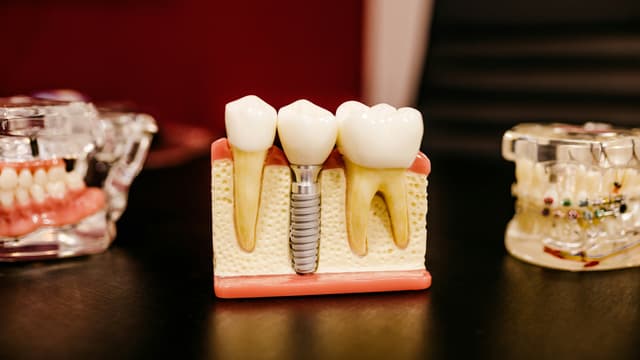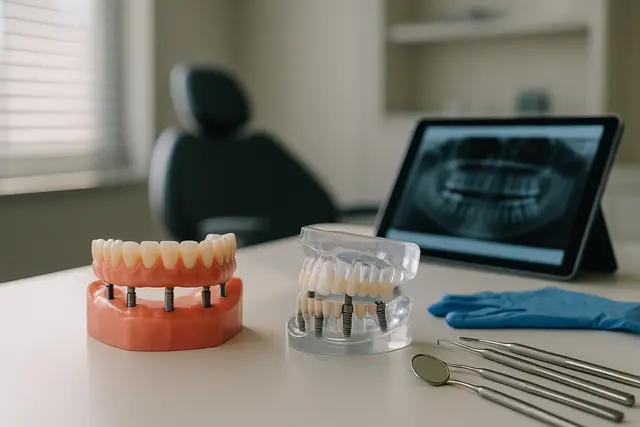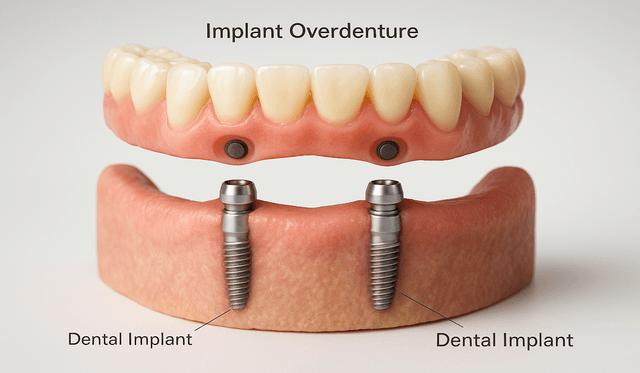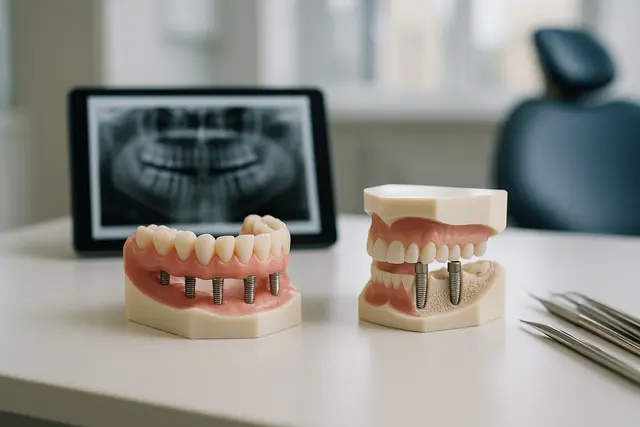Prosthodontics
6 min read
Mar 28, 2025
How to Care for Dental Implants: Cleaning, Foods to Avoid, and Maintenance
Dental implants offer a long-term solution for missing teeth. They look and feel like natural teeth and can last decades with proper care. But they are not self-sustaining. Good habits are key to protect your investment and avoid problems that could lead to implant failure.

If you’ve had dental implants recently or are thinking about getting them, first off, congrats. That’s a big step toward reclaiming your confidence, chewing power, and, let’s be honest, your smile. Dental implants are built to be strong, reliable, and long-lasting. But here’s the honest truth: they still need care. Not obsessive babying, but good old-fashioned attention, just like your natural teeth.
A dental implant won’t get a cavity, but the gums and bone around it? Totally fair game for trouble if you’re not keeping up with daily cleaning and smart choices. And no, this doesn’t mean you have to become a dental hygiene maniac, just someone who knows what to do and does it consistently.
Let’s get into it. Here’s your down-to-earth, no-fluff guide to caring for dental implants the right way.
What Exactly Is a Dental Implant, Anyway?
In simple terms, a dental implant is a high-tech way to replace a missing tooth. Your dentist places a small titanium post (aka the implant post) into your jawbone, this acts like the root of your lost tooth. After healing, a custom-made crown is placed on top. That crown looks and functions like a real tooth.
And if you’re replacing multiple teeth? Dental implants can support bridges, dentures, or even a full set of artificial teeth. So whether it’s one missing tooth or a full mouth restoration, there’s a solution for just about every situation.
But, and it’s a big but, the implant still depends on the health of the bone and gums around it. If you neglect that, you risk implant failure, gum disease, and eventually bone loss. Not to sound dramatic, but good oral hygiene isn’t optional. It’s the ticket to keeping that beautiful new tooth in place.
Why Daily Care Isn’t Just for Natural Teeth
Here’s a common myth: “It’s not a real tooth, so I don’t have to worry about it as much.” That’s a fast track to problems. Yes, your implant can’t get a cavity, but the tissue surrounding the implant absolutely can become infected or inflamed.
Plaque is still the bad guy here. It doesn’t discriminate. Left alone, it can cause the gums to swell, bleed, or recede, and when that happens, you lose support around your dental implant. Without proper care, bone loss around the implant can creep up silently, and before you know it, the implant isn’t so stable anymore.
So what does proper implant care actually look like? Think soft toothbrush, gentle circular motions, and brushing twice a day without fail. Treat the implant crown like you would a natural tooth, get around it from every angle, especially near the gum line.
Flossing: Yes, You Really Do Need to
Flossing around the implant isn’t a “maybe.” It’s a must. Bacteria love to hang out in tight spaces, and the area around your dental implants is one of their favorite party spots. If you let them stay too long, they can damage the tissue around the implant and even lead to implant failure.
Don’t worry, you don’t have to wrestle with floss. There are implant-specific floss options, soft picks, or even water flossers that make the job easier. Whatever method works for you, the goal is the same: clean the sides of the implant, the gumline, and between your teeth. Once a day. Every day.
If you’re thinking, “Is flossing really that important?”, just know that flossing around the implant is one of the top things that separates a long-lasting implant from one that fails prematurely. It’s five minutes that can save you years of trouble.
Foods That Can Hurt (and Help) Your Implant
Dental implants are sturdy, but they’re not indestructible. Crunching ice, chewing pens, or chomping on hard candy can crack the implant crown or damage the bone around it. So skip the jawbreakers and the popcorn kernels. They’re not worth the risk.
Sticky foods are another red flag. Taffy, caramel, and gum can yank at your crown or get stuck around the implant site, making it harder to clean and easier for plaque to settle in.
Now for the good news, there are plenty of foods that are not only safe but helpful. Soft fruits, leafy greens, and lean proteins are gentle on your implants and good for your overall oral health. Chewing crunchy fruits and veggies like apples and carrots is fine, just cut them into smaller pieces and chew gently on both sides.
And yes, hydration matters too. Dry mouth can increase plaque buildup, so drink plenty of water, especially after meals.
What Your Dentist Wants You to Know
Regular dental checkups aren't just about getting a gold star for clean teeth. Your dentist plays a critical role in your dental implant maintenance. They check the implant crown, the tissue around the implant, your bite alignment, and whether anything’s shifting or loosening. If you’ve got a denture attached to the implant, they’ll make sure it’s still fitting correctly.
Even if your implant feels perfectly fine, problems can sneak in quietly, like gum inflammation or early signs of implant failure. Your dentist can catch those early, which is why skipping visits is just not worth it.
Think of it like this: you got the implant to enjoy a strong, confident smile. A few dental visits a year help protect that investment.
What Happens If You Ignore Your Implant?
Not to sound like your mom, but ignoring your dental implant can go downhill fast. Let’s say you don’t floss, skip brushing a few nights, and cancel your checkups. You could start seeing bleeding gums or bad breath. Then comes inflammation, bone loss, and eventually, the implant might loosen or fail.
Implant failure isn’t just inconvenient, it can be painful and expensive to fix. And in most cases? Totally preventable with good dental hygiene.
If something feels “off” around the implant, like tenderness, swelling, or a wobbly feeling, don’t wait it out. Call your dentist. Early treatment is often quick and simple. Waiting makes it harder and more costly to fix.
Long-Term Success Comes Down to Habits
Want your implant to last 20, 30, even 40 years? It’s totally possible. In fact, some implants last a lifetime. But that only happens with long-term care.
Here’s a quick checklist to help you maintain dental implants for the long haul:
Brush twice a day (gently but thoroughly)
Floss daily (no excuses)
Use a soft toothbrush and non-abrasive toothpaste
Avoid hard and sticky foods
Stay on top of regular dental visits
Treat any discomfort or bleeding early
Ask about a nightguard if you clench or grind your teeth
That’s it. It’s not rocket science, but it does take consistency.
Your Implant Can Last a Lifetime, If You Let It
A well-placed implant, paired with proper dental implant care, can be one of the best decisions you ever make for your smile. Implants are designed to last, but they rely on you to make smart choices day-to-day.
You don’t need perfection. Just commitment. Show up for your dental hygiene, ask questions, and be mindful of how your mouth feels. That’s how you get a long-lasting dental solution that looks, feels, and works like a natural tooth.
Care for your dental implants like you care for yourself, because really, they’re one and the same. You deserve a smile that lasts, and with the right care, that’s exactly what you’ll get.
Do Dental Implants Need Special Daily Care?
Yes, dental implants require daily care similar to natural teeth. While the implant itself can’t get cavities, the surrounding gums and bone can still be affected by plaque and bacteria. Brushing twice a day, flossing daily, and maintaining good oral hygiene are essential to prevent infections like peri-implantitis.
Can You Floss Around Dental Implants?
Absolutely, and you should. Flossing helps remove bacteria from the gumline and sides of the implant, preventing inflammation and bone loss. Use traditional floss, a water flosser, or special implant floss to gently clean around the implant every day.
What Foods Should I Avoid With Dental Implants?
Avoid hard foods like ice, popcorn kernels, and hard candy, which can damage the implant crown. Sticky foods like taffy or gum can also be problematic by pulling at the crown or trapping bacteria. Stick with softer foods and chew harder items cautiously.
How Often Should I See the Dentist After Getting Implants?
Regular checkups, typically every six months, are important to monitor the health of your implant and surrounding tissue. Your dentist will check for signs of inflammation, bite misalignment, or early implant issues. Skipping visits can lead to preventable problems down the line.
Read Next
Related Posts

Prosthodontics
Implant Supported Dentures Overview
Missing teeth can impact more than just your smile, they can affect your confidence, comfort, and even your diet. Fortunately, modern dentistry offers a solution that’s both secure and natural-looking: implant-supported dentures. This innovative approach blends the stability of implants with the convenience of dentures to create a long-lasting, life-improving upgrade.
5 min read
Oct 29, 2025

Prosthodontics
Implant Overdentures Explained: The Hybrid Solution to Missing Teeth
Missing teeth can impact everything from your ability to eat to your self-confidence. While traditional dentures have long been a go-to solution, they often fall short in comfort and stability. Implant overdentures offer a modern alternative that combines the security of dental implants with the convenience of removable dentures, a true upgrade for those looking to reclaim their smile.
6 min read
Oct 29, 2025

Prosthodontics
Implant Retained Dentures Explained
Considering implant-retained dentures? You're not alone. As modern dentistry evolves, more people are turning to this secure, natural-feeling alternative to traditional dentures. This guide will walk you through what they are, how they work, and why they might be the solution you've been looking for.
4 min read
Oct 28, 2025
Don’t have time to research every dentist around you?
See why 30k+ patients trusted us